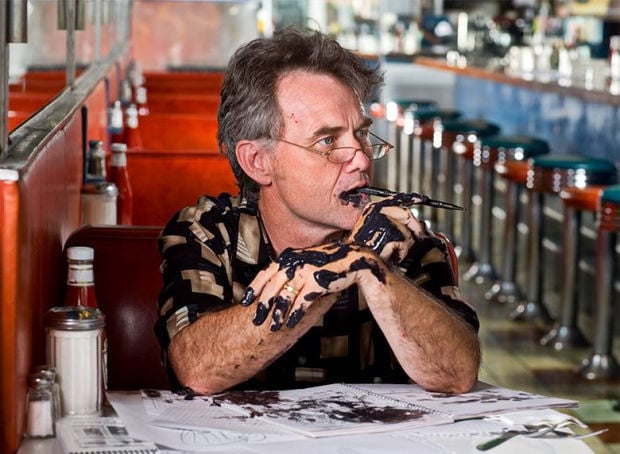“Furr’s Cafeteria? Every Sunday? You guys are so boring.”
Mom clutched her wounded heart and feigned a fatal blow. I was being a “real wise guy” at the dinner table, according to the retired Master Sergeant.
“Your mother had a life before you were born.” Not possible. The ancient silver-haired woman sitting across from me whose idea of a thrilling time was falling asleep watching “Perry Mason”?
Enlightenment struck with memorable clarity the day I came home early from Myers Elementary to see and hear, through our screen door, the same oh-so-boring golden girl singing and slow-dancing in our living room as Ella Fitzgerald sang “Ten Cents a Dance” on the Zenith.
“I work at the Palace Ballroom, but gee that palace is cheap.
When I get back to my chilly hall room, I’m much too tired to sleep.”
Mesmerized, I watched her through the gauzy screen as she floated around the ballroom of her imagination, like she was Ginger Rogers or something. Here before me was shocking evidence that she indeed had a life long before I was born, a life she would reveal to me, little by little, “when I was old enough to understand.”
“Ten cents a dance, that’s what they pay me,
Gosh how they weigh me down.”
Much to my surprise, Artha Jean had once been a beautiful 16-year old girl. Not possible. And she had been a bad girl who loved to dance so much that she fled Rockaway Beach, hitching rides in Model Ts all the way to California, to join a girlfriend in San Francisco who promised her a job dancing on a chorus line on the vaudeville circuit.
Not possible. My mom was Aunt Bea, not Ruby Keeler. She couldn’t be the same depression-era dame who competed in dance marathons, claiming, “I could dance forever. We’d sleep standing up. People would throw coins at us! Ha. I didn’t care.”
People threw coins at the woman who made me empty my pockets into every poor box and open hand she saw. Not possible.
“The chorus line and the marathons weren’t bringing in enough so I become a taxi dancer.” What? A dance hall dime-a-dance girl?
Every Mother’s Day, after I made a miserable breakfast and gave her a hand-scrawled card, the Master Sergeant, a man cursed with two left feet, would move the celebration to our living room, where he had set Glenn Miller loose wailing on the hi-fi. “Ask your mother to dance.” I’d recoil in awkward horror and then we’d all go to Furr’s. Happy Mother’s Day.
I remember doing homework at the dining table one evening, watching Mom do the dishes, when “Tea for Two” came on the radio.
“Picture you upon my knee,
Just tea for two and two for tea.”
She sprinkled a shaker full salt on the linoleum and began spinning and sliding gracefully across the salt like she was doing the shim-sham-shimmy at the Savoy Ballroom. I was seeing things. Not possible.
“Come here.” She stood me up next to her and slowly demonstrated the step.
“It’s the old soft shoe. Fred Astaire did it in ‘Top Hat’.” She adored Fred. “He used sand.” The only Fred I adored was named Flintstone. “Can I go now?”
“Find the beat. Try it. One and two and—”
After a few minutes of me frantically hopping about like Gabby Hayes being told to dance by a gunslinger, Mom stopped and sighed.“Just like your father. Well, at least you can draw. We all have our gifts.”
“What’s dad’s?”
“Raking gravel.”
The instant Mom heard my senior prom was days away, she asked me what the theme was.
“They’re going to have a big swing band and we’re —”
“Come here. You’re going to learn the Lindy hop. You’ll like it.” She cued up “In the Mood” and spun me around like we were at the Avalon Ballroom.
I stepped on her toes. I fell twice. And I didn’t like it. Mom was a natural dancer and I was simply a maladroit disappointment. Sigh.
In her 65th year, Artha Jean became bedridden and it became my responsibility to help her to the bathroom and back. Three or four times a day I would lift her into a standing position, drape her arms around my shoulders and rock her gently from side to side, as we shuffle-danced across the room.
Days before she left the world, I was waltzing her to her bathroom when she rested her head on my shoulder, like an exhausted marathon dancer, and just stood there, swaying in my arms. I followed her lead, as I had done my whole life, and danced her gently around the ballroom of her imagination. “I love to dance,” she whispered. “Me, too, Mom. Me, too.”





